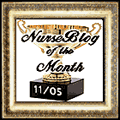Empathy by Experience
 In the spirit of full disclosure, I think this should be posted at the door to the Emergency Department. I'm sure it certainly feels like this to the patients.
In the spirit of full disclosure, I think this should be posted at the door to the Emergency Department. I'm sure it certainly feels like this to the patients.
I became a nurse at a relatively young age, when I didn't know my head from a hole in the ground. With age and life experience came an increasing ability to empathize with what my patients were going through.
I understand why parents are absolutely petrified by febrile seizures. Nothing like finding your 18-month-old blue on the side of the bed and beginning rescue breathing. I know the fear brought on by caring for a child with a fever of almost 105 degrees.
I understand what it is like to have a syncopal episode during your orthostatics after losing 6 pounds in two days from gastroenteritis. And trying to explain to an ER doctor, after eight hours, liters of saline, with a blood pressure of 80 systolic, fire-like pain in your entire GI tract and two children at home under age 5 that you want to be admitted.
I understand what it's like to have abdominal surgery for a ruptured, hemorrhaging ovarian cyst, 11 1/2 hours after I presented with severe abdominal pain. I know what it is like to have an NG tube shoved up both sides of your nose to the point that you feel it is perforating your eye sockets, because they let me DRINK two liters of water so I'd have a full bladder for the ultrasound. I know what it's like to wait for the specialty consult for six hours until office hours are completed. And finally, I know what it's like to have your insurance company count your "first post-op day" as the same day you went to surgery even though you didn't go to surgery until 2330.
I know what it is like to stand by the bedside of your 62-year-old father who has had a massive right sided cerebral hemorrhage, who was transferred to another hospital because they had a better neurology service and was met at the ambulance doors of the ER by a nurse saying, "Oh great, who is this? We weren't expecting this!" and putting my father in the hallway for his care, before admitting him to the oncology unit because there was no room on the neuro floor and then not getting a neurologist consult until over a day later.
I also know what it is like to be admitted for chest pain, have a great nurse and to hear the emergency room doctor fight for me to get a private room because "she's one of us and we take care of our own". And I didn't even work at that hospital!
So, when patients show up in the emergency department, I greet them with a smile and try to make the entire experience easier by explaining what will happen and why. I always give them their call bell so that I can come to them and they don't have to send a relative to search for me. I try to make the family feel as though they are welcome, even if it's just giving color books or stickers to siblings. I facilitate whatever I can. I'm not a perfect nurse, but I've discovered it doesn't take a lot of energy to treat people with a smile.
It's funny. Patients are always saying, "Sorry to bother you, but...." I tell them that it's never a bother, that it's what I'm there for.
It's what I do.
As a nurse.











3 Comments:
Love the post! So incredibly heartwarming. :)
You can always tell the health care professionals that have been through it themselves.
I've watched someone I loved die, just to have a nurse say in an annoying tone to me and the man's daughter as we waited outside the room, "Um, he's dead now. You can leave."
I've gone through a four hour cardiac ablation with four groin sheaths, with only 25 mg of Benadryl to help with anxiety, and nothing for pain.
I've been the ER patient left in a room for two hours without seeing anybody.
It sucks being a patient, and I know that. I've always tried to remember that, although sometimes I fail.
You're so right - it never hurts to smile. Aside from our technical skills, we need excellent customer service skills. And we have to juggle a million things, but still be polite and attentive.
I find myself running interference for some nurses who have absolutely no interpersonal skills or tact, smoothing things over with patients, families and doctors, and avoiding major blowups.
We can do it. There's nothing more satisfying (other than a successful code) than having a patient and family leave feeling that they were well taken care of and telling you that they appreciate your care.
Post a Comment
<< Home